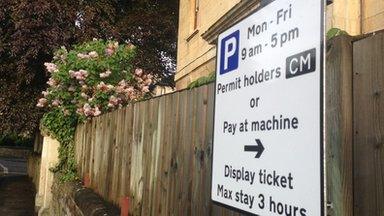Q&A: How will Bristol parking permits affect residents?
- Published

There are three resident parking zones in Bristol although this could be extended to a further 18 across the city
Over the next 18 months, residential parking zones are set to be introduced across Bristol.
The idea, put forward by the city's mayor George Ferguson, has proved controversial since it was first announced.
Currently, the scheme operates in the Cotham, Kingsdown and central areas of the city.
The mayor wanted to roll out the scheme city-wide, but after heavy criticism from councillors eight areas were removed from the list in June.
So what are the issues people are worried about and why are the plans provoking such opposition?
Why are the plans being introduced?
The scheme is designed to stop commuters from parking in residential streets during the day, in a bid to help reduce congestion in the city.
Bristol City Council has also said this will help improve air quality and create a safer environment because there will be fewer cars on the road.
The zones are also part of the council's sustainable transport policy and are strongly supported by Mr Ferguson.
How much will it cost?
Under the proposal, business owners may have to pay up to £500 for one annual customer permit with residents paying between £48 and £192.
How will it solve the problem of commuter congestion?
The city council is pushing for all zones to take up the scheme but tailored to each area's needs.
The mayor argues that if an area rejected a zone it could soon become the car park for the neighbourhood next door which may have brought one in.
But, the political parties believe communities should still be given the chance to opt out.
Who supports the plans?
Unsurprisingly, the areas which have the schemes in place are in support of the zones.
A six-month review carried out by the council found that of the 216 responses it received in Kingsdown only 10 were against the zones.
In Cotham, there is mixed support.
Plans for a similar scheme in Cliftonwood were turned down in 2010 after residents told the city council they did not want it, although there is a residents' group in favour of the idea.
The areas set to go ahead with the scheme are:
•Cotham North
•Redland
•Montpelier
•St Pauls
•Easton and St Phillips
•Redcliffe
•Spike Island
•Bedminster East
•Southville
•Bower Ashton
•Cliftonwood and Hotwells
•Clifton Village
•Clifton West
•Clifton East
Who is against the plans?
The council estimates there are about 18,000 cars parked by commuters every day in Bristol.
Traders have expressed concern about the parking zones, arguing that as parking costs would eat into their profits.
Guy Kingston, from the Federation of Small Businesses, said it was "killing off Bristol's economy".
A petition against the city-wide zones, organised by Bristol resident Michael Owen, has now been signed by more than 5,000 people.
This petition sparked a full council debate which resulted in changes to the proposed blanket roll out of the zones.
In Ashton, Bedminster West, Windmill Hill, Totterdown and Bishopston, Ashley Down, St Andrew's, and St Werburgh's the scheme has been put on hold until the effect of the inner schemes is known.
Where will the commuters park if the zones come into force?
If the zones come into force, commuters will have to pay for short-term parking along residential streets using pay and display areas, or pay to use car parks for the whole day.
The council has also said it has a package of measures to improve public transport, such as the Bus Rapid Transit scheme.
Commuters would also be encouraged to use the train, park and ride sites or walk and cycle to work.
Who has the final say?
A detailed proposal will be made for each area - where residents can give their feedback. After this, there will be a statutory consultation period before the council makes a final decision.
Once that decision is made, the council will write to everyone in the area to let them know.
However, the city's mayor does have the power to force through the plans.
- Published11 June 2013